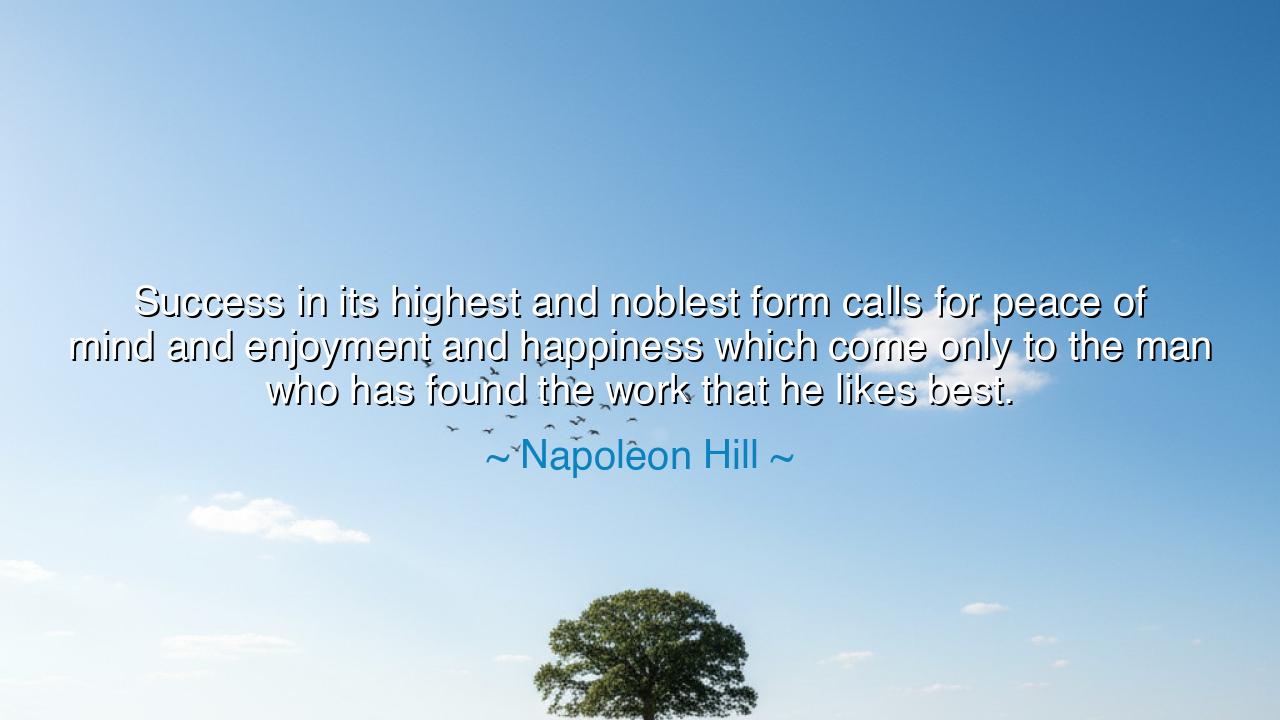
Success in its highest and noblest form calls for peace of mind
Success in its highest and noblest form calls for peace of mind and enjoyment and happiness which come only to the man who has found the work that he likes best.






“Success in its highest and noblest form calls for peace of mind and enjoyment and happiness which come only to the man who has found the work that he likes best.” Thus spoke Napoleon Hill, the philosopher of achievement and the chronicler of human ambition. In this saying, Hill reaches beyond the common notion of wealth and victory, teaching that true success is not found in gold or glory, but in harmony — the sacred alignment between a man’s work and his soul. For what good is triumph if it brings no joy? What meaning is there in riches if they purchase not peace of mind, but only restlessness and regret?
In the ancient traditions of wisdom, from the Greeks to the sages of the East, this truth has been whispered across centuries: that the highest calling of man is to unite labor with love. To work without joy is to live as a slave to circumstance; to work with joy is to live as a master of destiny. Hill, who studied the lives of the great — inventors, leaders, creators — found that their power was born not from obligation, but from passion. Happiness, he teaches, is not the reward of success — it is the foundation of it. Only when a person discovers the work that sings to his spirit does he unlock the calm, creative energy that leads to greatness.
The origin of Hill’s wisdom lies in his lifelong study of the human will. Born into hardship in rural Virginia, he rose through perseverance and curiosity to become one of history’s greatest teachers of personal development. His masterpiece, Think and Grow Rich, was more than a guide to fortune — it was a map to fulfillment. He spoke with men like Andrew Carnegie, who taught him that money is but a shadow of purpose, and that purpose itself springs from love of labor. To find joy in one’s work, Hill declared, is to find the true philosopher’s stone — the power that turns not metal, but life itself, into gold.
Consider the example of Thomas Edison, who toiled for years in his workshop, driven not by the hunger for riches, but by the pure delight of discovery. When asked about his tireless effort, he replied, “I never did a day’s work in my life. It was all fun.” Here was a man who embodied Hill’s teaching — whose peace of mind came not from ease, but from purpose. While others sought rest, Edison found rest in his labor, for he had discovered the work he loved best. In such devotion lies the secret of nobility, the art of transforming toil into triumph.
Peace of mind, as Hill describes it, is not a gift given by fate; it is the fruit of right alignment between one’s inner nature and one’s outer deeds. A man may climb to great heights by ambition alone, yet his heart may remain unquiet. But when his work becomes the expression of his truest self — when he feels that he is both giving and growing — then his life ceases to be a burden and becomes a joy. Success, in this nobler sense, is not measured by applause or possessions, but by the quiet contentment that fills a person who knows he is where he belongs.
Yet such discovery requires courage — the courage to look inward, to ask, “What is the work that calls to my soul?” Many live their days chasing the expectations of others, mistaking conformity for duty. But Hill calls upon each person to listen to the whisper within — that divine voice that speaks of purpose, of talent, of destiny. It is not always the loudest path that brings fulfillment, but the truest one. To find that work, one must dare to turn away from the noise of the world and follow the stillness of the heart.
Let this, then, be the teaching: Do not measure your success by the trophies of the world, but by the serenity of your spirit. Seek work that gives you life, not merely a living. In every field — whether you build, heal, teach, or create — let your labor be a reflection of your passion. If you rise each morning eager to begin, if you rest each night with gratitude for what you have done, then you are already among the truly successful.
Thus, the wisdom of Napoleon Hill becomes a beacon for all who wander in search of meaning. The world will praise achievement, but the wise will seek peace of mind; the crowd will chase fortune, but the enlightened will chase joy. For in the end, the greatest wealth is to love one’s work, and the greatest triumph is to live each day with happiness as one’s companion. To find that harmony is not merely to succeed — it is to fulfill the very purpose of being alive.






AAdministratorAdministrator
Welcome, honored guests. Please leave a comment, we will respond soon